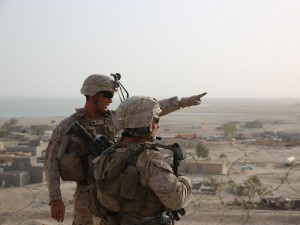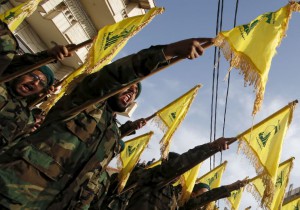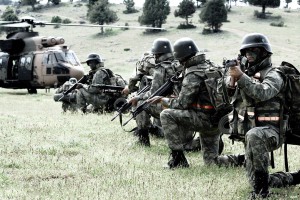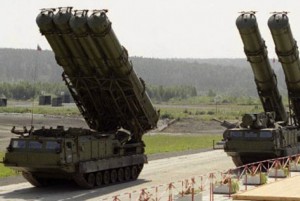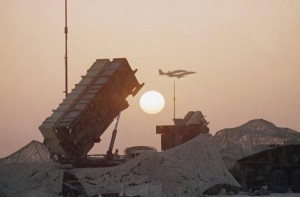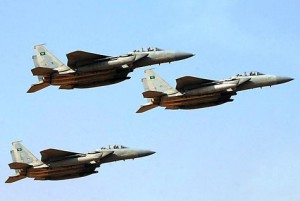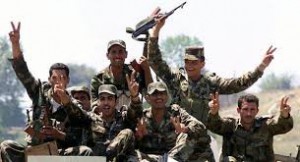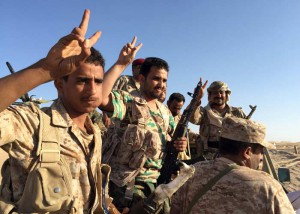It’s not a door-to-door fight, but the war on ISIS is heating up…
The Iraqi army’s recent triumph in Ramadi made it clear that their soldiers aren’t cut from the same cloth as those who ditched their gear and fled in terror from the Islamic State group in 2014 — and Marines have been a pivotal part of that transformation.
Hundreds of Marines have been quietly deploying over the past 16 months to assist the Iraqis fighting to retake territory, hard won by U.S. troops over the past decade or more, from brutal ISIS militants.
As 2015 drew to a close, the Iraqi army hoisted its flag above the center of Ramadi’s city center and declared victory. The seven-month struggle to retake the gateway city in western Anbar province was bloody and costly, but dealt ISIS a strategic blow and proved that the Iraqi military — with coalition air support — is capable of sustained offensive operations.
It also opened the door to greater U.S. involvement and a follow-on drive to retake the northern city of Mosul.
But Marines have played a “critical role” in Operation Inherent Resolve, the Defense Department’s campaign against the terror group, Marine Commandant Gen. Robert Neller told Marine Corps Times last month. The Marine Corps’ mission in Iraq has been a quiet one, in part because ISIS vowed to seek revenge on anyone responsible for bombing the group’s strongholds in places like Iraq and Syria. Last year, the group’s so-called hacking division released the names, photos and addresses of 100 U.S. troops, calling on supporters inside the U.S. to carry out attacks against them.
“I think we have shown a lot of flexibility,” he said.
From April to October, for example, Marines with Special-Purpose Marine Air-Ground Task Force–Crisis Response–Central Command flew more than 8,300 combined flight hours, delivered almost 2.8 million tons of cargo throughout the region and launched airstrikes against ISIS strongholds on a daily basis.
They directly trained Iraqi soldiers and advised and assisted Iraqi leadership to ensure accurate intelligence and precise airstrikes. They kept watch over the U.S. Embassy in Baghdad and remote military outposts, and stood at the ready to recover downed aircraft and pilots at a moment’s notice. They also worked side-by-side with America’s regional allies to prepare them for the fight.
When President Obama announced in June that U.S. troops would reopen the abandoned Al Taqaddum Air Base in Anbar province to directly support Iraqis in the battle with ISIS, hundreds of Marines landed there within hours. They immediately established a defensive perimeter and began construction of what would become a fulcrum for the Iraqi’s fight.
As Defense Secretary Ash Carter moves to dramatically increase operational spending for the fight against ISIS from $5.3 billion to $7.5 billion, even more Marines could find themselves on the ground in Iraq. Here’s a look at what Marines can expect from their new Iraq mission.
Advise and assist
Col. John McDonough was on the ground in June when the Marines landed at Al Taqaddum.
“It’s an area that folks have looked at for some time; it gained a heck of a lot more attention and urgency after the fall of Ramadi,” he said. “We immediately got in there and within 96 hours were running kinetic strikes on the battlespace.”
As commander of an advise and assist team from II Marine Expeditionary Force, McDonough deployed to Iraq in January 2015 with a 26-man contingent to directly counsel senior Iraqi military leaders, first at Al Asad Air Base and then Al Taqaddum.
McDonough and his team helped the Iraqis plan their operations. They shared critical intelligence about the enemy and used that information to coordinate airstrikes.
“It was about understanding the battlespace, locating bad guys and then bringing in coalition aircraft on them,” he said.
McDonough said he found working with the Iraqis motivating.
Many of the Iraqi generals have been in the fight for more than 20 years, with some having battled against Iran in the 1980s, he said. They had lost their homes, family members or friends to ISIS or al-Qaida. Many had been displaced three or four times, were fired five or six times for political or sectarian reasons, and were fighting ISIS with extremely limited resources in the very neighborhoods where they grew up.
McDonough said he repeatedly watched 19-year-old soldiers eagerly head into the fight with minimal weapons training and without flak jackets, helmets or any possibility of helicopter medical evacuation.
“To be surrounded by people like that, for whatever their real or perceived shortcomings, combat capability and military sophistication; people you can break bread with, fight next to, see them suffer losses and continue to drive on, that was pretty inspiring,” he said.
Making Al Taqaddum operational
Master Sgt. Roy Hall originally deployed as the intelligence chief with an advise and assist team.
Once the Marines got the order to reopen Al Taqaddum, his mission changed and he was tasked to serve as the senior enlisted adviser there. As he worked alongside the Iraqis, he said he quickly realized they understand the challenges they face.
“They’re motivated, they’re committed to the fight,” Hall said. “They feel they’ve got a good handle on the battlespace and everything’s going in a positive manner; it’s good to hear their fighting spirit’s so high.”
Once his mission changed, Hall was responsible for building up the new base and its center of operations, Camp Manion, named after Marine Silver Star recipient 1st Lt. Travis Manion, who was killed in Iraq in 2007.
Hall said he set out to determine how to sustain the troops who would be living at the once-abandoned air base.
“There’s got to be somebody who cooks the chow, somebody that fixes the generators and everything else that comes along with support,” he said.
Slogging through 125-degree heat in July and incessant cold rains beginning in November, Marines have transformed Camp Manion from a spartan outpost to a sprawling complex sustaining hundreds of coalition troops, enabling the advise and assist mission.
“Every day this camp changes, continually improves,” Hall said. “My security forces are improving force protection, my engineers are improving the facilities. It’s a phenomenal sight to see.”
Securing the base
On his first deployment to Iraq, Cpl. Richard Ortiz was pleasantly surprised when arrived at Camp Manion in October.
The squad leader with 1st Battalion, 7th Marines, expected to be eating meals ready-to-eat in the dirt, but life at the base wasn’t as bad as he feared, thanks to the work Hall and his team accomplished there.
Ortiz deployed with about 2,500 members of the Marines’ crisis response force for U.S. Central Command, which operates across several countries. Once in theater, Ortiz and his squad were dispatched to Iraq where they’re responsible for providing security along the approximately 130-mile perimeter of Al Taqaddum — often alongside Iraqi security forces.
Ortiz and his Marines work six hours on and six hours off, conducting fixed site security, running dismounted patrols and manning a quick reaction force.
“So far so good,” Ortiz said. “It’s always raining, always cold, but other than that it’s going easy for us; we’re always ready for whatever comes our way.”
When patrolling, Ortiz spends a lot of time on the outer perimeter of the expansive air base, with eyes on the surrounding area. The infantryman was initially taken aback by what he saw.
“I thought it was just desert out here,” he said. “There are cities, trees, people walking around, cars on the highway. I didn’t expect that.”
Ortiz was also surprised at how aggressive the Iraqi soldiers are.
“What I saw on the news was a bunch of Iraqis dropping their guns and running away,” he said. “From what I’ve seen, they’re a bunch of motivated, hard-chargers with Marines and soldiers backing them up. That’s one of the reasons they’re back in the fight — they see a bunch of hard-chargers behind them and just want to go out there and get some.”
Setting up lifelines
Iraq was new ground for Sgt. Joseph Gerdeman. The 21-year-old had never seen a camel and hadn’t been outside the U.S. before getting his combat boots dusty last year at Al Asad.
The technical controller with 9th Communications Battalion’s Alpha Company, based out of Camp Pendleton, California, helped keep network and communications links up and running for the second rotation of SPMAGTF-Crisis Response-Central Command.
“I was excited. I was ready,” Gerdeman said. “I had been waiting [to deploy] for a few years. It was kind of a relief.”
Gerdeman went through predeployment training before shipping off to Iraq, but said he had no idea what to expect once he got to the communications shop at Al Asad. Those deploying with him hadn’t been to Iraq either, so Gerdeman said he got some insight on what to expect from Marines who had.
Traveling through Kuwait, Gerdeman “hit the ground running” when he arrived at Al Asad last spring, and the expansive base became his permanent home for the next seven months. An old, hardened hangar doubled as living quarters and work space. Heaters warmed the space before portable air-conditioning units cooled the air once spring settled into summer.
“It was blazing hot all the time,” he said, which made for grueling days of intensive manual work in the field carrying and laying out fiber optic cables, setting up antennae and scrambling to solve outages.
The gritty desert environment is never kind to electrical equipment, so blowing sand and dust ensured near-constant attention and cleaning. The Marines quickly realized the open hangar needed some interior walls to better seal off some of their equipment.
For most of the deployment, Gerdeman said he worked 12 hours on, 12 hours off before shifting to an eight-hour work cycle. He managed communications and satellite networks, and served as the primary troubleshooter when things went wrong.
“Outages were [a big challenge], especially when we realized it just wasn’t something we could fix,” he said.
While things were rough at first, Gerdeman said he managed to share some of his lessons learned with the unit that replaced his once he left Iraq. Though he and his Marines only left Al Asad briefly to work and experience life outside the wire, Gerdeman said it was easy to see that providing seamless communications to the entire task force was a critical part of the Corps’ success in Iraq.
“I learned so much while I was there, just from the experience,” he said. “I found out things the hard way … [but] we got to see all the time how we impacted the mission.”
Training the Iraqis
Staff Sgt. Daniel Arcand is one of the Marines backing up the Iraqi troops.
At Al Asad Air Base, approximately 100 miles west of Al Taqaddum, Arcand trained Iraqi security forces to take on ISIS as part of the Marines’ “building partner capacity” mission.
While the advise and assist mission is dedicated to supporting Iraqi military leadership through operational advice, intelligence and coordinating air support, the BPC mission directly provides instruction and training to Iraqi soldiers.
“It was everything from small-unit tactics, firearms and weapons manipulation to patrolling techniques — anything a basic infantryman needs to know to fight the enemy,” Arcand said.
On his sixth deployment since 2004, the infantry unit leader with 3/7 has extensive experience working with the Iraqi military.
Unlike some of his previous deployments, Arcand said the Iraqis he trained showed a strong dedication and willingness to learn.
“There’s an enemy occupying their country and for the most part, you’re going to have people that want to learn how to take care of the problems in their own country,” he said.
Most notable, Arcand said, was their significant improvement in firearms handling, both in manipulation and marksmanship. The Iraqis were also incredibly motivated, which sometimes presented a challenge to the trainers.
“They’re in the middle of nowhere and surrounded by the enemy, so keeping them focused on training and not getting overzealous was an issue that we were running into,” he said. “[We] were trying to keep them on the scheduled training plan. They wanted to just go out and try to fight.”
Arcand empathized, however. During his 2008 deployment to Iraq, the mission had shifted to developing the Iraqi military, rather than Marines going out and taking on the enemy.
“Marines, and infantry Marines in particular, are offensive in nature,” Arcand said. “Being on a defensive mission, keeping everybody focused and reminding them that anything can happen at any time, that was the constant focus for leadership over there.”
Preparing for crises
As commander of 3rd Battalion, 7th Marines, the ground combat element of the Corps’ crisis response unit for CENTCOM, Lt. Col. Ross Parrish oversaw the range of Marines’ missions to support Operation Inherent Resolve.
This included providing a crisis response force in the region 24 hours each day, seven days a week, dispatching security forces to Al Asad and Al Taqaddum, augmenting security at the U.S. Embassy in Baghdad, and overseeing training with military partners outside of Iraq.
Parrish said his Marines demonstrated a great deal of discipline and mental flexibility in adapting to the more defensive nature of these missions.
Whenever possible, they would incorporate offensive measures when establishing defensive positions, he said.
“It’s a dynamic [area of operations] and a dynamic enemy, and the conditions that the Marines faced were dynamic, so they constantly improved their positions, like Marines do.”
The less kinetic nature of the mission also hit home personally with the Marines. Marines are back in some of the same places they’ve cleared before, sometimes repetitively, he said.
“Now the Iraqis are fighting to rid the area of Daesh,” Parrish said, using another name for ISIS. “It’s different because we’re fully in a secondary role to support the Iraqi security forces. We’re not in the active role that we were before in clearing operations, [counterinsurgency] operations, out living with the Iraqis.”
Iraqi forces, however, are much more professional and better trained today, he said, and Marines are working very well with them.
“We used to go with them all the way through the fight,” Parrish said. “In this deployment, we’re not in the fight with them; we’re advising and assisting, providing [intelligence, surveillance and reconnaissance] and fire support of their attacks.”
The TRAP mission
Just months after the first Marines began deploying to CENTCOM with the crisis response force, Jordanian fighter pilot Lt. Moaz al-Kasasbeh crashed near Raqqa, Syria, following mechanical failure of his aircraft.
Al-Kasasbeh survived but was captured by ISIS before coalition forces could extract him. He was held captive by the terror group, and militants later filmed themselves dousing him in gasoline and burning him alive.
Now the Marine crisis response unit provides critical support to American and allied aviators carrying out the bombing campaign against ISIS.
Quietly flying above the theater or sitting on a runway at an undisclosed location, the crisis response Marines — who deploy with a a detachment of MV-22B Osprey tiltrotor aircraft — were prepared 24/7 to respond to unforeseen contingencies, such as security reinforcement, evacuation of non-combat personnel or tactical recovery should a coalition aircraft go down.
“What we did was develop a scaleable unit that was able to deploy at a moment’s notice,” said 1st Sgt. Jason Dicosimo of India Company, which made up the TRAP, or Tactical Recovery of Aircraft and Personnel force for 3/7. “Whatever the call was, we were still able to do that concurrent with everything else we had going on at the time.”
While the TRAP mission is still relatively new, Dicosimo said its fundamentals are already deeply engrained in Marines.
“As far as [rapid deployment for] reinforcement or noncombatant evacuation, that’s something we’re always training for,” he said. “We ran the gamut of training possibilities of different things we might run into when we got [to Iraq]. We trained for TRAP and crisis response, we trained for it all.”
Late last June, the TRAP force met its first challenge recovering a downed aircraft. When an Air Force MQ-1 unmanned aerial vehicle crashed in a remote area in southern Iraq, the TRAP force was ready.
Within hours of the crash, they descended on the site to recover the drone’s sensitive components and destroy its remains, marking the first time one of the Marine Corps’ special-purpose Marine air-ground task forces carried out that type of mission, according to a Marine Corps press release.
Embassy security
Far from the dusty tents and field-expedient kitchens of Al Taqaddum, grunts were augmenting the Marine security guard detachment already in place at the U.S. Embassy in Baghdad.
The fine dining, posh living quarters and swimming pools at the complex were not something every Marine gets to experience without formally going through the embassy program, said Gunnery Sgt. Craig Wilcox, an infantry unit leader with 3/7.
“The U.S. government has obviously poured a lot of money into the facility,” he said. “Being part of an infantry battalion, living in these conditions was very, very unique and much appreciated — especially for a guy like me who didn’t always deploy and sleep on a bed.”
The State Department has a long history of working with Marines, and understand what they bring to the mission, he said.
“They’re very much ready to take care of the Marines; we were never at a want for anything,” Wilcox said.
The long hours standing post for static security didn’t come without challenges, though, and Wilcox said it was vital that his Marines stay on high alert in a place like Baghdad.
“It’s not something your average 18-year-old infantryman is really excited to do,” Wilcox said. “You have to make sure that every day when he goes to post, he understands why he’s there and that there’s a very high level of government that needs him there on top of the building.”
Staying sharp also required nonstop training. When the Marines with 3/7 weren’t standing post or sleeping, he said they were training.
“We’re infantrymen, so we have to be ready for anything to happen,” Wilcox said. “[Training] not only kept us sharp as an organization, but it really kept the Marines in check and understanding that you’re still a rifleman, you’re still in Iraq.”
Collecting evidence
Keeping his Marines motivated during lulls was also on the mind of 1st Lt. Brian Rickards.
He was the officer-in-charge of the Marines’ crisis reponse unit’s law enforcement detachment, and his team quickly realized their mission was much different than what many Marines came to expect from past combat deployments in the Middle East.
“It’s not the Iraq War,” Rickards said. “…You’re kind of just walking into the unknown.”
Rickards, a 26-year-old assigned to 1st Law Enforcement Battalion out of Camp Pendleton, led a 20-member detachment ranging from lance corporals to staff sergeants. They brought a mix of skills and capabilities, including four military working dogs, two criminal investigators, eight nonlethal weapons instructors and a correctional specialist. Before deploying, they spent three months training for security detail and evidence collection.
His team split its time between Al Asad and Al Taqaddum in Iraq and the task force’s headquarters in Kuwait.
“We were pretty mobile,” Rickards said.
Rickards said his team was at the forefront of analyzing information that could be pulled off the battlefield.
“We are, in essence, the first line of collection for evidence,” he said.
Missing throughout the deployment were the kinetic operations Marines expect in a place like Iraq, he said.
“There was a lot of waiting,” Rickards said. “That is more stressful. [Marines] just want to have a mission.”
Being part of a crisis response unit can be unpredictable, and things can change quickly given Iraq’s security situation and politics.
“That was the hardest leadership challenge we faced — keeping the Marines focused on the mission,” he said. “Sometimes it get monotonous. Sometimes there’s a lot of cool things going on.”
Rickards participated in a few key leader engagements during the deployment, which he said helped local leaders understand the Marines’ role in their region.
While his Marines might have been hoping for cool war stories from Iraq, Rickards said they still learned a lot during their time there.
“I don’t know if we found that during this deployment, but I think it was a unique experience, regardless,” he said.
marinecorpstimes.com
